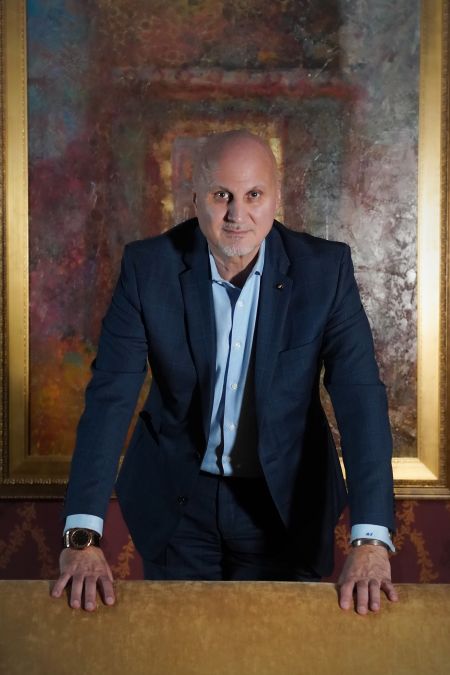
AHMED ISSA, GENERAL MANAGER, SHANGRI-LA ABU DHABI: "LUXURY HOSPITALITY INVOLVES BALANCING SKILLS, CULTURAL FIT, AND A COMMITMENT TO EXCELLENCE" (United Arab Emirates)
In Abu Dhabi, the Shangri-La complex is a household name led by a citizen of the world, Ahmed Issa, who's been with the group for more than 20 years. |
 |
AHMED ISSA, GENERAL MANAGER, SHANGRI-LA ABU DHABI: "LUXURY HOSPITALITY INVOLVES BALANCING SKILLS, CULTURAL FIT, AND A COMMITMENT TO EXCELLENCE" (United Arab Emirates)
In Abu Dhabi, the Shangri-La complex is a household name led by a citizen of the world, Ahmed Issa, who's been with the group for more than 20 years. |
Category: Middle East - United Arab Emirates - Careers
- Interviews and portraits
- Career - Interviews - Industry leaders
Interview made by Sonia Taourghi on 2024-05-21
 Ahmed Issa, General Manager of Shangri-La Qaryat Al Beri, Abu Dhabi
Photo credit © Shangri-La Group
From there, Shangri-La became his family and he became a founding figure of what the Abu Dhabi complex is today. "I worked my entire life in hospitality, which is somehow related to luxury. Luxury does not only mean having the most beautiful hotel in the world. In our terms we call a hotel a product, like a hardware, and the software is us the people. And if you have the passion, the mentality, the thought process and if you have the willingness, people will always continue to attend and experience."
Ahmed Issa oversees the Qaryat Al Beri complex, which includes the luxurious Shangri-La Hotel with 214 rooms and suites, Shangri-La Residences with 161 five-star full-service flats, Traders Hotel with 301 rooms and suites, and The Villa by Shangri-La with 6 ultra-luxury themed villas with private pool.
Answering a few questions, Ahmed Issa gives us some insights on the profession in Abu Dhabi and the specificities of the market.Journal des Palaces : What attracted you to luxury hospitality in the first place?Ahmed Issa: Luxury hospitality captivated me from the start due to its ability to create unforgettable moments and touch people's lives through heartfelt service and attention to detail.
Over my 35 years in the industry, I've witnessed how genuine hospitality can transform experiences and leave a lasting impact on guests.Your career has been mostly at Shangri-La. What keeps you so dedicated and passionate about the brand?My journey with Shangri-La has been deeply fulfilling, driven by a shared commitment to excellence and a genuine connection to the brand's core values.
The opportunity to lead teams at Shangri-La hotel, Residences, and Traders Hotel in Abu Dhabi allows me to continuously innovate and exceed expectations, shaping memorable experiences for our guests.
Our hotelhas 57 to 60% long-lasting servicing colleagues, that have been with us for more than seven years, and those are tremendous assets. If you have someonewho stays that long, you know they are doing their job from the heart and make sure we are providing the upmost experience for our guests and the impact will be tremendously high.What are the biggest changes and challenges for luxury hospitality you observed in Abu Dhabi?Abu Dhabi's luxury hospitality landscape has evolved significantly, with a notable shift towards personalised experiences and sustainability. One of the key challenges is balancing traditional luxury expectations with the increasing demand for authentic and immersive experiences that reflect the local culture and values.What are the main differences you observed between the different Emirates?Each Emirate in the UAE offers unique hospitality experiences, reflecting a blend of local traditions and global influences. Abu Dhabi, as the capital, stands out for its rich cultural offerings, distinctive entertainment experiences, and stunning natural landscapes, including iconic landmarks like the Sheikh Zayed Grand Mosque, Louvre Abu Dhabi, pristine beaches, and desert dunes.In your opinion, what sets the luxury hospitality culture aside in the Emirates?The luxury hospitality culture in the Emirates is characterised by an unwavering commitment to personalised service, meticulous attention to detail, and a deep appreciation for diverse cultural influences.
The Emirati hospitality ethos prioritises genuine connections and immersive experiences, ensuring that guests feel truly valued and cherished during their visit.Who are your target customers in Abu Dhabi?We cater to individuals and groups who appreciate luxury, authenticity, and personalised service, making our complex ideal for business travellers, families, couples, and those seeking exclusive leisure experiences in the heart of the capital.What are your biggest challenges when recruiting?Recruiting top talent in luxury hospitality involves balancing skills, cultural fit, and a commitment to excellence. Our main challenge is finding team members who embody our values, deliver exceptional guest experiences, and are a good cultural fit in a competitive market. We always hire for attitude, and we train for skills because we believe that skills can be taught if you have the right attitude and the right mindset. When we hire, we pretty much reinvent our thought process and our planning process.
Additionally, we focus on developing our team members to grow within our organisation.What would be your advice to someone looking at pursuing a career in luxury hospitality in Abu Dhabi?For those interested in a career in luxury hospitality in Abu Dhabi, I recommend exploring the local culture and understanding the UAE market. Continuously learn and show genuine passion for hospitality, while focusing on networking to gain diverse experiences. Developing a strong work ethic will be key for success in this dynamic field.
|
|







